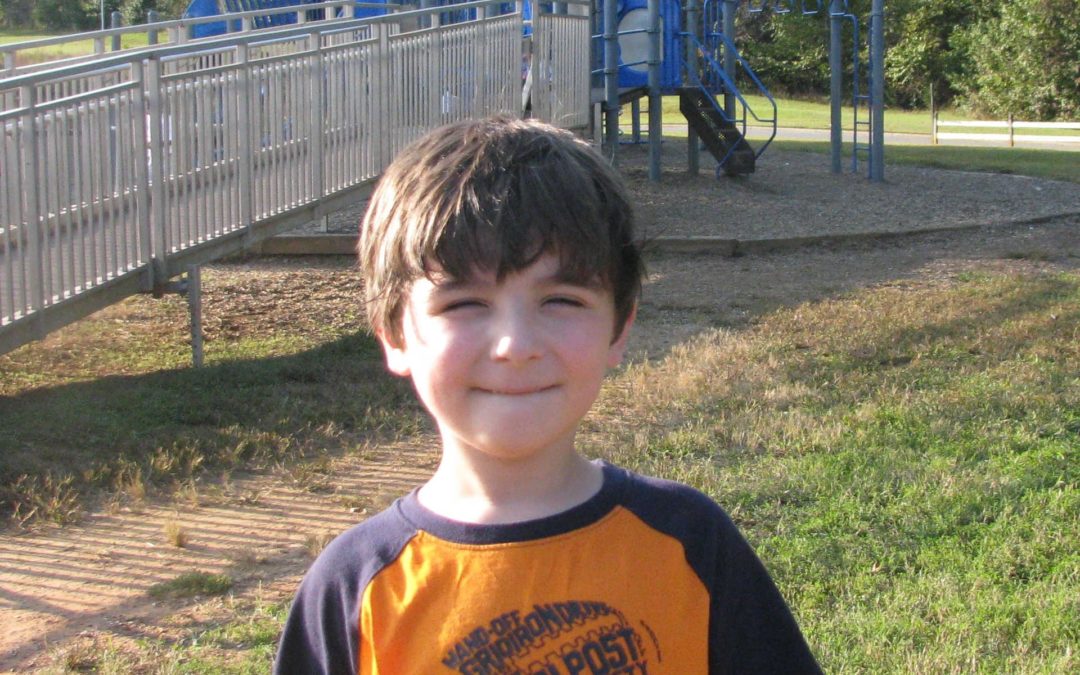By Guest Blogger Jessie Tucker Mitchell
It’s mid-October and autumn has brought falling leaves, pumpkins on front porches, and crisp, clear mornings; the school year is well underway. Kids have settled into their new classroom routines, made new friends, gotten to know their teachers and possibly even started complaining about homework. My seven year old son Fletcher transferred to a new school this year, and he appeared to make the transition smoothly, with barely a glitch. Fletcher has autism along with high anxiety and obsessive-compulsive disorder, so seamless transitions are unexpected gifts.
Last year, Fletcher was in a small special needs class at Sherwood Forest Elementary, and by March he had made so much progress academically and socially that his teacher, Ms. S, suggested moving him to a “regular” classroom for the following school year. I had read about the endless benefits for autistic children when they interact with neurotypical peers, and I was so excited that I almost cried tears of joy (and okay, I did cry later, when no one was around to stare at me). The only issue was that Fletcher would need a resource teacher who could pull him out of the classroom every day for several hours of academic help, and the closest school that offered such a program was Jefferson Elementary. We loved Sherwood Forest, but moving to a new school seemed like a no-brainer, considering the many benefits it would bring. My husband and I discussed it for about three minutes, then jumped at the opportunity.
So, almost two months ago, on August 29, Fletcher started attending Jefferson. He loved it from the start. His neurotypical peers shrugged at his quirks and welcomed him without reservation, and he quickly made friends everywhere: in his main classroom, in his smaller resource group, on the playground, in his afterschool program. Each afternoon when I picked him up, he looked like every other little boy cheerfully digging through the sandbox or whooshing down the slide, and I said silent prayers of thanks as I stood at a distance and watched him playing with his peers. “We made the right decision,” I told my husband. “He’s thriving.” For us, his emotional well-being was what mattered most.
But last week, out of the blue, Fletcher asked me when he was going back to Sherwood Forest. I was taken by surprise. “Well,” I said, fumbling for a response, “you’re not going back, Fletcher. Jefferson is your school now.”
He looked shocked; then his face crumpled and he began to cry. “But I miss my teacher!” he sobbed. “I miss my friends!”
I hugged him to me, trying to calm him even as I panicked inside. “Listen,” I finally said, “I’ll email Ms. S and ask if we can visit her one day, okay?”
He rubbed the tears from his face and managed a small smile. “Okay.”
This whole scene took maybe two minutes, but I felt shaken for a long time afterwards. I guess I’ve seen my older two children, now in seventh and fifth grades, go with the flow so much through the years – adapting easily to new schools and new teachers, quickly making new friends, and casually accepting that change in life is inevitable– and I always assumed Fletcher would react the same in a similar situation. After all, he bounced around between two schools during his preschool and kindergarten years and never seemed bothered by it. It never occurred to me that switching schools in first grade, which might cause a twinge of anxiety in the neurotypical child, would lead to great distress in a child on the spectrum. But now, I feel so foolish for not anticipating it, for not being prepared. After all, Fletcher has always found comfort in the predictable, the routine, and even small changes in his daily schedule can lead to a panic attack (just ask his teacher what happened when the school had a tornado drill). Plus, he is a tender, old soul, and he knows when someone genuinely loves and values him, as Ms. S did. Of course leaving her behind and moving to a new school, even with new teachers to love him just as much as his old one did, would make him feel a little sad.
And in a way, I realize, Fletcher’s feelings are a blessing. Think about it: Every one of us can name two or three favorite teachers that we remember from elementary school, even if we haven’t seen them in decades. Growing attached to these special adults is a natural part of childhood. Yet many kids on the spectrum find it difficult, if not impossible, to bond with anyone, even someone who showers them with love. That Fletcher remembers Ms. S so clearly and fondly shows how far my autistic son has come. Just a few short years ago, he was a withdrawn, despondent three year old, and I would watch him play alone at the train table in his classroom, ignoring his peers, and wonder if he ever would stop seeing other people as a source of torment. The person Fletcher has become is infinitely different, much happier, more outgoing, more alive. He finds pleasure in socializing and in making friends. New friends, both young and old, now are a source of joy.
And isn’t that what each of us want for our children? We want them to see the value in others, to appreciate them, and to recognize – and reciprocate – the tender, rare feeling of being truly loved. I praise God that my son now experiences genuine happiness, and that he is no longer merely existing in this world, but actually thriving in it instead.

















Thanks for sharing Fletcher’s story! Ms. S is pretty amazing!
Sweet story. I hope you shared this with Mrs. S. Thanks for sharing on TMoM!